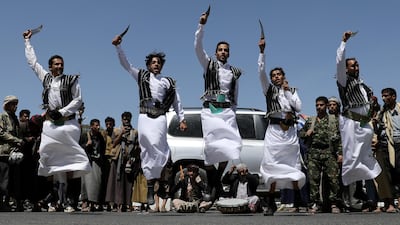The Houthi rebels in Yemen have denied entry to the top UN human rights official and ordered his plane to take off from the capital, Sanaa, just after landing, officials said on Tuesday.
The development followed a damning report by experts commissioned by the Office of the High Commissioner for Human Rights detailing abuses by the rebels in Yemen's civil war, including sexual violence against women in rebel-run prisons.
Just after the UN representative, Elobaid Ahmed Elobaid, landed in Sanaa on Monday, rebel security officers boarded the plane, withdrew his travel permit and ordered the plane to leave, officials told AP.
The UN agency's Rupert Colville confirmed Mr Elobaid's expulsion from Sanaa but would not elaborate.
The decision came a day after the UN welcomed the rebels freeing hundreds of prisoners in a move it said could revive the stalled peace process, which includes a proposed prisoner swap agreed on at peace talks in Stockholm last year.
The Iran-aligned Houthis agreed in December with Yemen's Saudi-backed government to swap prisoners as a confidence-building step.
But the arrangement has been stalled as the sides struggled to agree on implementation. Each side was meant to release about 7,000 prisoners.
The Houthis said on Monday they were releasing "350 prisoners and detainees" drawn from the list prepared for the deal, including three Saudis.
The UN special envoy for Yemen, Martin Griffiths, welcomed the initiative.
"I hope this step will lead to further initiatives that will facilitate the exchange of all the conflict-related detainees as per the Stockholm Agreement," Mr Griffiths said.
The Arab Coalition led by Saudi Arabia and including the UAE intervened in Yemen in March 2015 after the Houthis ousted the Yemeni government in 2014.
Houthi officials have claimed to have captured as many as 2,000 pro-government soldiers. But this figure has been denied by the government.
The rebels also claimed responsibility for massive September 14 attacks on Saudi oil installations that knocked out half of its production and sent shockwaves through world energy markets.
But the US and Saudi Arabia blamed Iran, saying the strikes were carried out with weaponry that was beyond the capability of the Houthis.

